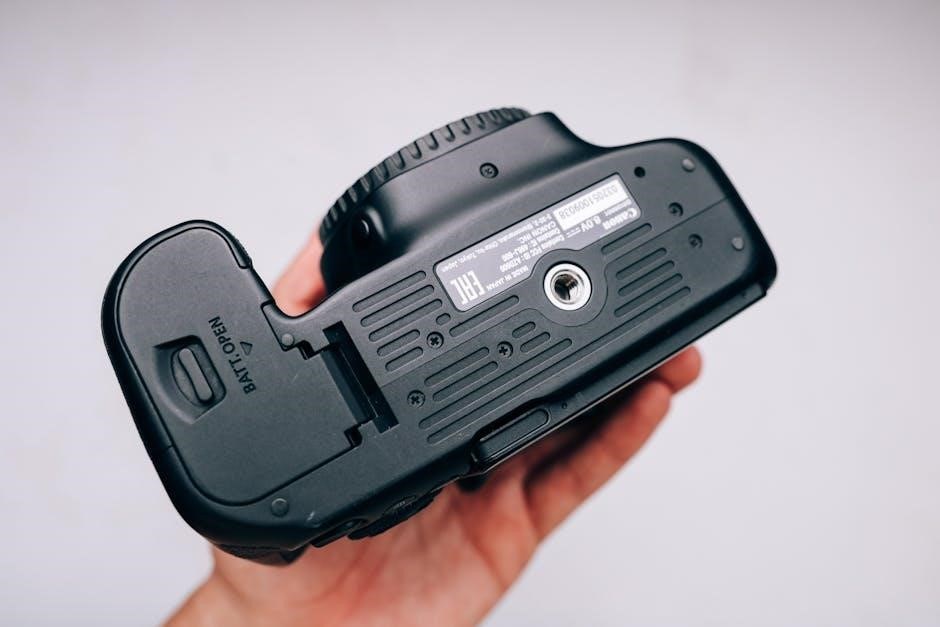The Mercedes 12V Battery warning is a common alert that appears on the dashboard, often accompanied by a message like “12V Battery ⎯ See Owner’s Manual”. This warning typically indicates an issue with the vehicle’s 12V battery system, which could involve low charge levels, faulty sensors, or a malfunctioning battery. It’s essential to address this promptly to avoid potential disruptions in your vehicle’s operation.

Common Scenarios When the Warning Appears

The Mercedes 12V Battery warning often appears in specific scenarios, as reported by numerous owners and enthusiasts. One common situation is when the vehicle has not been driven for an extended period, leading to a low battery charge. Drivers may notice the warning after short trips where the alternator doesn’t have enough time to recharge the battery fully. Additionally, the alert may surface during cold weather, as low temperatures can affect battery performance and charging efficiency.
Another scenario involves the warning appearing after the battery has been replaced or serviced. In some cases, the system may not reset properly, causing the alert to linger even if the battery is functioning correctly. Some owners have also reported the message after updating the vehicle’s software or maps, which can temporarily stress the electrical system. Furthermore, drivers who frequently use auxiliary systems like infotainment or lights for extended periods may trigger the warning due to increased battery drain.
In a few instances, the warning has appeared unexpectedly during routine driving, often after the vehicle has been parked for a short time. This could indicate a deeper issue, such as a faulty sensor or a malfunctioning alternator. In some cases, the message has been linked to the vehicle’s start/stop technology, which relies heavily on the 12V battery. If the system detects irregularities in battery performance, it may trigger the alert as a precautionary measure.
Overall, the 12V Battery warning is a sign that the vehicle’s electrical system needs attention, and addressing it promptly can prevent more severe issues down the line.

Possible Causes of the 12V Battery Warning
The Mercedes 12V Battery warning can be triggered by several factors, ranging from simple issues to more complex system malfunctions. One of the most common causes is a low battery charge level, which can occur if the vehicle is not driven for extended periods or if the electrical systems are used heavily while the engine is off. This prevents the alternator from recharging the battery adequately.
Another potential cause is a faulty battery sensor or faulty voltage regulator. These components monitor the battery’s charge level and communicate with the vehicle’s onboard computer. If they malfunction, the system may incorrectly interpret the battery’s status, leading to the warning. Additionally, a weak or aging battery can cause inconsistent power supply, especially in cold weather, when battery performance naturally decreases.
The warning may also appear due to issues with the alternator, such as a malfunctioning belt or worn-out brushes, which can prevent it from charging the battery properly. In some cases, parasitic drain caused by accessories like dash cams, phone chargers, or alarms can drain the battery when the vehicle is turned off, triggering the alert.
Less commonly, the warning could be linked to software glitches or communication errors within the vehicle’s electrical system. For example, if the battery control module fails to communicate correctly with the dashboard, it may display the warning erroneously. In rare instances, a loose battery terminal connection or corrosion can also cause the system to detect irregularities in the battery’s performance.
Understanding the root cause is crucial for resolving the issue effectively, as the warning is often a symptom of an underlying problem that needs attention.

Diagnosing the Issue
Diagnosing the cause of the Mercedes 12V Battery warning requires a systematic approach to identify the root cause. The first step is to check the battery charge level using a multimeter or a professional battery tester. A fully charged battery should read between 12.4V and 12.7V when the engine is off. If the voltage is significantly lower, it indicates a discharged battery that may need recharging or replacement.
Next, inspect the battery terminals for any signs of corrosion or loose connections. Clean the terminals if necessary and ensure they are tightly secured. A visual inspection of the battery itself can also reveal swelling, cracks, or other signs of damage that may require immediate attention.

The vehicle’s onboard diagnostics (OBD-II system) can provide valuable information. Using an OBD-II scanner, you can retrieve specific error codes related to the battery, alternator, or electrical system. Common codes include P0560 (System Voltage Low) or P0645 (Voltage Reference Circuit Open), which can guide further troubleshooting.
Testing the alternator’s output is another critical step. With the engine running, the alternator should charge the battery at a voltage of approximately 13.5V to 14.5V. If the voltage is outside this range, the alternator may be malfunctioning. Additionally, checking for parasitic drain involves measuring the current draw on the battery with all accessories turned off. A draw exceeding 50mA typically indicates a problem.
If these steps do not reveal the issue, it may be necessary to consult a qualified technician who can perform advanced diagnostics using specialized tools. They can assess the battery control module, sensors, and wiring to identify any hidden faults. Accurate diagnosis ensures that the appropriate repairs are made, preventing further complications and maintaining the vehicle’s reliability.

How to Fix the 12V Battery Warning
To address the Mercedes 12V Battery warning, start by understanding the root cause identified during diagnostics. If the battery is simply depleted, charge it using a suitable charger and ensure it reaches a full charge. For models with advanced battery systems, use a charger approved by Mercedes-Benz to avoid damaging the sensitive electronics.
If the battery is old or damaged, replacement is necessary. A professional technician should install the new battery and reset the vehicle’s electrical system to prevent any lingering issues. After installation, drive the car for an extended period to allow the battery to fully integrate with the vehicle’s systems.
Inspect the alternator and charging system. If the alternator is malfunctioning, it may not be charging the battery properly. Test the alternator’s output voltage with the engine running; it should read between 13.5V and 14.5V; If it falls outside this range, the alternator may need replacement.
Address any corrosion or loose connections on the battery terminals. Clean them with a wire brush and a mixture of water and baking soda to ensure proper conductivity. Tighten all connections securely to avoid intermittent power supply issues.
If a parasitic drain is detected, identify and disconnect any accessories or systems drawing excessive power. This can often resolve the issue and prevent future warnings. Finally, consult the owner’s manual for specific guidance, as some models may require system resets or updates after repairs.
By systematically addressing these potential issues, you can resolve the 12V Battery warning and restore your vehicle’s optimal performance. If unsure, always seek assistance from a qualified Mercedes-Benz technician to avoid further complications.

The Role of the Owner’s Manual
The owner’s manual plays a crucial role in understanding and addressing the Mercedes 12V Battery warning. While the manual may not always provide detailed troubleshooting steps, it serves as the primary guide for initial diagnosis and recommended procedures. For instance, it often suggests giving the vehicle a good run to recharge the battery or checking for potential electrical issues.
Sections related to battery maintenance and electrical systems are particularly relevant. The manual outlines proper charging techniques, emphasizing the use of approved chargers to avoid damaging the vehicle’s sensitive electronics. It also provides insights into jump-starting procedures, specifying the correct connection points in the engine compartment to ensure safety and effectiveness.
Additionally, the manual highlights the importance of addressing low battery charge levels promptly. It advises owners to drive the vehicle for an extended period to allow the alternator to recharge the battery fully. This simple step often resolves the warning, especially if the issue stems from insufficient charging due to short drive cycles or prolonged standby periods.
While the manual may not cover every scenario, it remains a valuable resource for understanding the basics of the 12V battery system. It encourages owners to consult authorized Mercedes-Benz specialists for complex issues, ensuring that repairs are performed correctly and safely. By following the manual’s guidance, owners can take the first steps toward resolving the warning and maintaining their vehicle’s health.

Preventative Maintenance Tips
Preventative maintenance is key to avoiding the Mercedes 12V Battery warning and ensuring your vehicle runs smoothly. Regularly checking the battery’s charge level and terminals can help identify potential issues early. Clean the terminals to prevent corrosion, as this can disrupt the electrical connection and trigger the warning.
Driving habits also play a role. Avoid frequent short trips, as the alternator may not have enough time to fully recharge the battery. Instead, take longer drives occasionally to allow the battery to replenish. If you notice the warning frequently, it may indicate a deeper issue, such as a failing alternator or battery degradation.

Monitoring the vehicle’s electrical systems is another proactive step. Avoid overloading the battery with high-drain accessories, especially when the engine is off. Always follow the owner’s manual guidelines for charging the battery or jump-starting the vehicle to prevent damage to the electrical system.
Lastly, consider having your battery tested annually or during routine maintenance; A professional can assess its health and recommend a replacement if needed. By adopting these habits, you can minimize the likelihood of encountering the 12V Battery warning and keep your Mercedes running reliably.
By understanding the causes of the warning and following the recommended steps in the owner’s manual, drivers can take proactive measures to resolve the issue. Whether it’s charging the battery, checking connections, or consulting a professional, timely action is essential to maintain your Mercedes’ performance and reliability.
Remember, regular maintenance and awareness of your vehicle’s electrical health are vital to avoiding the 12V Battery warning. Stay informed, follow guidelines, and ensure your car continues to operate at its best. If the issue persists, seeking assistance from a certified technician is always the safest and most effective solution.